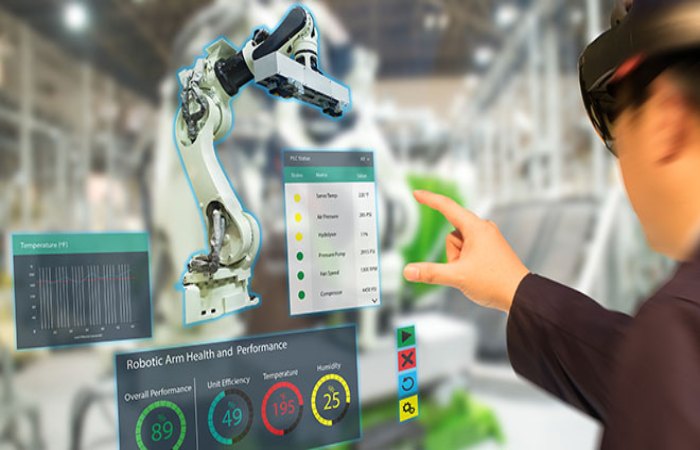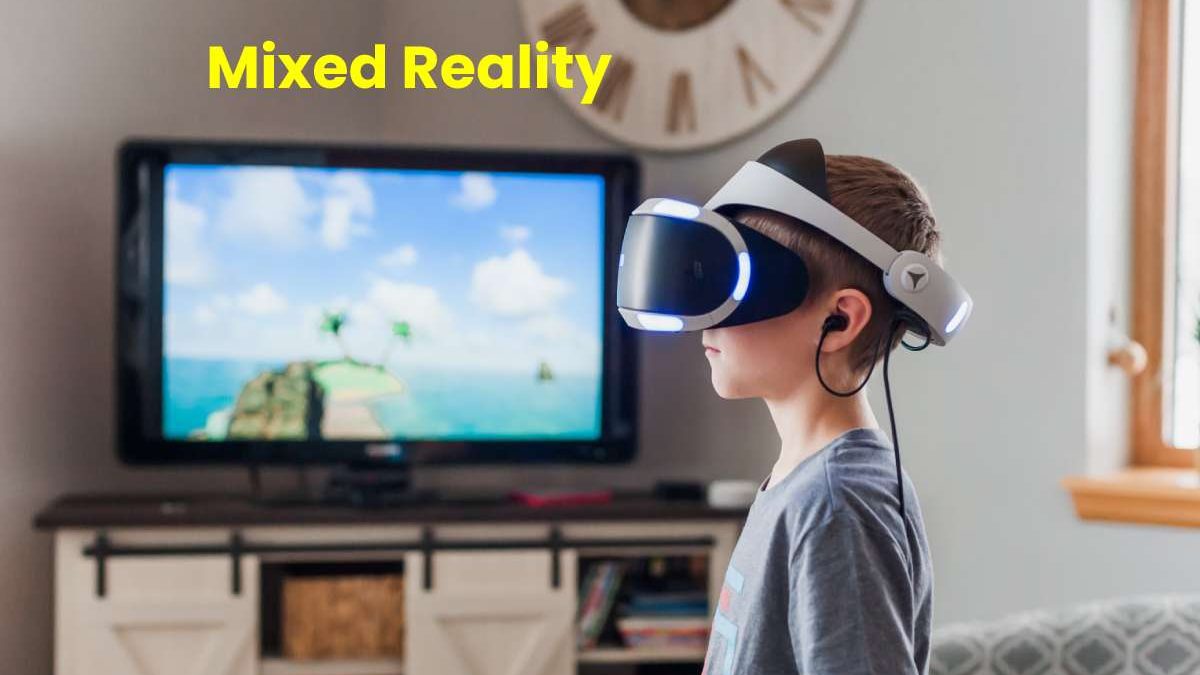Mixed reality or MR is a fusion between the real and virtual worlds to produce new environments. In other words, it is a space in which the interactivity of virtual reality and the visual power of augment reality are mixed. In this way, physical and digital objects coexist in real-time.
For many, mixed reality brings together the best virtual and augmented reality: the user can enter a natural environment and interact with virtual elements through a headset. Its objective is to create virtual objects and modify them through interaction with the natural environment. For example, if you place a virtual object on a real table, mixed reality apps will register it and move it with the table if you move the table to another location.
Table of Contents
How does Mixed Reality Work?

Mixed reality seeks to bring the real world to the virtual one. To do this, it is necessary to generate a 3D map of reality and, based on it, superimpose virtual information. In this way, both types of facts could be combined.
However, the translation of the natural world into a 3D model is one of the significant challenges. One of the techniques used is to scan the space in real-time; generate a 3D map from which the surfaces are analyze. Thus, the device enables the option to place the visual elements in the exact places.
Additionally, the system is programmed differently depending on the intention.
- Introduce a real object in the virtual world: A record must be made in real-time with three-dimensional images. Then, you enter the virtual world.
- Introduce a virtual object in the real world: The system creates an interface with marks to which a computer responds by employing a previous reading (camera). This information will be the code with which the computer generates the virtual images. And so you can position the virtual scene according to the position and rotation of the marks.
Differences Between Augmented Reality, Virtual Reality, and Mixed Reality
Although they seem similar, and one emanates from the others, the truth is that these three technologies are not the same. Therefore, we will briefly explain what each one consists of.
Virtual Reality
Create a 100% immersive experience. The user is in a digitally generate environment in which he is completely immersed. In addition, it seeks to simulate a complete sensory experience in an artificial environment. It requires special glasses and headphones, and the glasses usually cover the eyes so that only the screen is visible. They also include sensors that identify the movement of your head to reproduce it in the virtual environment.
Augmented Reality
The generate content is superimposed on the natural environment. That is, the actual environment is complement with digital objects. It would help if you had a computer, cell phone, or glasses that reproduce digital objects in the background. The mix is done without a connection between the two environments, so there is little context. An example of this is Pokémon Go.
Mixed Reality
A mixture of the previous two. It unites a clear perception of the natural environment and virtual elements with a realistic appearance and behavior. It allows interaction with these digital objects. only requires a helmet or googles with an internal CPU.
Unlike virtual reality, mixed reality starts with a physical space and places objects on top. It does not require special gloves, and you need to see the natural environment. On the other hand, it differs from augmented reality in that the user can interact directly with virtual objects in mixed reality. In addition, virtual objects serve as interactive elements in the virtual environment.
Advantages and Disadvantages of Mixed Reality
Advantages of Mixed Reality
- Eliminate physical limits: Mixed reality helps break down the walls. It allows us to glimpse past or future elements, existing or not, and include them in our lives.
- Versatile: Although the technology has not been perfect, it is known that it could positively impact numerous fields: from education to medicine, thanks to its versatility.
- New products: Its development can contribute to promoting new commercial products and services. In addition, it can generate more impact in marketing campaigns.
- Positive business impact: This technology can help increase sales in businesses and shops and drive better performance by employees.
- Facilitates training: It makes learning a more attractive and entertaining task in educational spaces.
Disadvantages of Mixed Reality
- Experimental technology: So far, the development of this technology is testing. Its optimal result has not been achieve, and immersive experiences still have flaws.
- High technical requirements: Mixed reality devices will require powerful hardware that reduces slowdowns and errors.
- Health effects: The constant use of your devices can cause sensory disorientation, headaches, or eye discomfort.
- Ignorance: There are not many who know this technology. If you don’t see how to use it, it can be useless.
Mixed Reality Apps
Mixed reality offers us a unique opportunity: turn any space into another and interact with it. It could help us feel part of the movies; have more immersive gaming experiences; improve education or turn your living room into an aquarium. We mention some of its main applications.
Army
Mixed reality could be use to optimize military training. That is, it is harness to improve the performance of the military by providing information to stay current in a changing operational context. It can also be use to plan, organize, and train joint operations. In this way, better decisions can be made, information analysis optimize, and costs reduce.
Medicine
With the help of mixed reality, a surgeon could see virtual items that help him during an operation. Thus, you can generate more accurate operations planning and reduce surgical material. This technology canister has a very positive impact on medicine.
Similarly, it can be use as a training exercise for health professionals. An example is “over the shoulder” surgeries, where surgical students can be taught remotely by experts while performing surgeries in real-time or through 3D holograms instead of 2D diagrams in books.
Video Game
The entertainment sector could greatly benefit from mixed reality. Mixed reality could take over from virtual or augmented reality in certain apps and games. This, thanks to the integration of elements with greater precision and interaction with the user. It also has user gesture recognition. Therefore, it is one of the disciplines that makes the most progress.
Education
Education could be positively impacts by mixed reality. To begin with, you could engage students with their learning environment by projecting situations, examples, and shapes. The introduction of 3D objects and simulations would help children acquire a complete sense of what they study.
It could also improve learning methods by including simulations of tasks built virtually in a natural environment. It is believe that it could help, especially in understanding complex concepts. Of course, it would play a facilitating role in personalizing children’s learning processes. As a bonus, it can be use on subjects and topics.
Conclusion
Mixed reality combines real and virtual worlds to produce new environments and visualizations where physical and digital objects coexist and interact in real-time.


